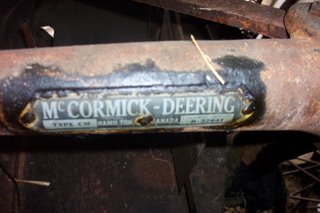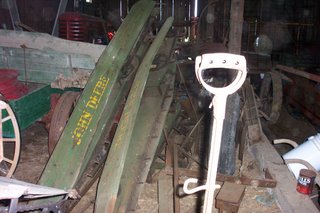

 My dad has long enjoyed the hobby of scouring the area barns and ditches for the vesitiges of yesterday's farming equipment. I spent many a winter afternoon as a young lad holed up in the shop or barn fixing up these relics so that they could embark upon yet another journey in this late stage of their life, heading out east to be purchased by Amish and Mennonite farmers who will revive these old tools into 21st century farming implements.
My dad has long enjoyed the hobby of scouring the area barns and ditches for the vesitiges of yesterday's farming equipment. I spent many a winter afternoon as a young lad holed up in the shop or barn fixing up these relics so that they could embark upon yet another journey in this late stage of their life, heading out east to be purchased by Amish and Mennonite farmers who will revive these old tools into 21st century farming implements.I have somewhat of a love-hate relationship with old equipment. I enjoy history and I like seeing and learning about this old, horsedrawn equipment. I sometimes wish that I lived back in a simpler time that saw the landscape dotted by small farmsteads that were ran by families laboring together to live off of the land. These were not simple days, no doubt, for to survive required the sweat of the brow and the blood from wounds that were the result of hard, rigorous labor. Yet I have heard the old farmers sit around the tables at the local eating cafes speaking of getting together for the purpose of harvesting crops and raising barns. These days one rarely feels the need to know his neighbor, unless, of course, it is for the purpose of suing him when his dog leaves a deposit in the freshly groomed yard.
Yet I have a certain hatred for this old equipment. When one looks at my dad's barn full of old farming equipment, a quick, straight forward glance reveals the nostalgic impression of farming days gone by. You can smell the vesitiges of deisel fuel and boiled linseed oil liberally applied to old rusty chains and weather wearied boards. The smells of old twine and equipement would bring back a smile to many an old time farmer. I know better, however, than to be fooled by the Norman Rockwell-like display of American nastalgia, for when you turn your back, the old implements turn into snarling demons. Grease, rust, and grime are awaiting to soil your new pair of work jeams. Sharp, jagged lances of rusty iron are glistening with the thought of ripping clothing assunder and tearing gaping wounds into the flesh. Rust and corruption are giggling at the thoughts of the torn and lacerated knuckles that would dare to remove old bolts. Then there is the weight of the iron itself.... there is no plastic on these relics! No aluminum, no styrofoam, no, nothing at all that is easy to lift. It is just back-breaking, muscle-straining, fiber tearing sheer masses of incredibly dense and heavy iron. Yes, I carry the scars and wounds of fighting with these old dinasours, my dad, brothers, and I doing the manual labor of loading these things - staggering weights that would make a modern crane stand proud at the thought of moiving.
The first picture is a picture of a very nice McCormick grain binder. Cyrus McCormick first developed the first reaper, which took the place of using a hand swung sickle to cut the grain. The reaper slowly evolved into the binder when components (rollers, chains, tying device) were added to tie the grain into bundles with twine and a carrier was added to stack 5 or 6 bundles until they could be dropped off to make a schocks. Shocks varied from 6-9 bundles and they sat into the fields waithing for the threshing machines to separate the grain from the stalk. The threshing machines were first powered by steam and then later powered by a large belt driven by a pully mounted on a tractor. The binder was pulled first by horses and later by a small tractor. A steel wheel meshed with a series of gears powered the binder as it moved across the field.
I'll not be dishonest. I like to travel quickly, I enjoy air conditioning, and I like my electric powered wood working tools. I also enjoy using the computer. Yet for me real joy is derived as
I sink my hoe into my garden. I like to sit back and smell the freshly turned earth and listen to the sound of the corn growing in the ros. enjoy sharpening a plane iron and testing its edge on a piece of oak, smiling to myself as the keen edge takes off a whisker-thin shaving. I enjoy taking my dovetail saw and cutting some hand sawn dovetails to put a drawer together. Yes, I have a router jig, a dovetail router bit, and a router and I use them nearly exclusively when I want to put together a dovetailed drawer. But sometimes I like to turn off the radio, unplug the router, and take off my hearing protectors, and listen to the grating sound of a sharp saw cutting wood. Oh yea, there is then the feeling of the sweat beading upon my brow and running down my temple. It's labor, and sometime it hurts, but it is part of our portion that God has given us as we live out our days under the sun. And it is glorious...

1 Comments:
Great post!! Whatever man creates eventually falls apart and decays, unless vigorous efforts are made to maintain it. There are many modern technologies that have made life easier in a good way, for which I greatly appreciate, but it seems that they do come with a price. They can create the deception of self-sufficiency and satisfaction, where one no longer needs to sweat by one’s brow beside his neighbor, something I believe is good for us.
Post a Comment
<< Home